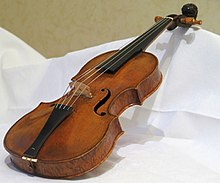violin
English
[edit]
Etymology
[edit]From Italian violino (“little viola”), from viola + -ino (forming diminutives).
Pronunciation
[edit]- IPA(key): /ˌvaɪəˈlɪn/
Audio (General American): (file)
- (Hong Kong) IPA(key): /ˌvaɪ.oʊˈlin/, [ˌwaʊˈlin]
- Rhymes: -ɪn
Noun
[edit]violin (plural violins)
- (music) A small unfretted stringed instrument with four strings tuned (lowest to highest) G-D-A-E, usually held against the chin and played with a bow.
- When I play it like this, it's a fiddle; when I play it like this, it's a violin.
- 1960, P[elham] G[renville] Wodehouse, chapter XX, in Jeeves in the Offing, London: Herbert Jenkins, →OCLC:
- She was looking more like Sherlock Holmes than ever. Slap a dressing-gown on her and give her a violin, and she could have walked straight into Baker Street and no questions asked.
- (inexact, sometimes proscribed) Any instrument of the violin family, always inclusive of violins, violas, and cellos and sometimes further including the double bass.
- The string quartet, one of the most popular groupings in chamber music, is composed entirely of violins: two violins proper, one viola, and one cello.
- (music, metonymically) The position of a violinist in an orchestra or group.
Usage notes
[edit]The distinction between violins and fiddles is typically contextual and cultural. The same instrument is considered a violin when playing classical music in formal settings, a fiddle when playing folk or country music, and variously described in other settings (such as jazz and rock) depending whichever term seems more appropriate to the speaker.
Synonyms
[edit]Derived terms
[edit]Related terms
[edit]Descendants
[edit]Translations
[edit]
|
Verb
[edit]violin (third-person singular simple present violins, present participle violining, simple past and past participle violined)
- (transitive, intransitive) To play on, or as if on, a violin.
See also
[edit]Anagrams
[edit]Catalan
[edit]Verb
[edit]violin
- inflection of violar:
Danish
[edit]Etymology
[edit]From Italian violino, diminutive form of viola with diminutive suffix -ino.
Pronunciation
[edit]Noun
[edit]violin c (singular definite violinen, plural indefinite violiner)
Declension
[edit]| common gender |
Singular | Plural | ||
|---|---|---|---|---|
| indefinite | definite | indefinite | definite | |
| nominative | violin | violinen | violiner | violinerne |
| genitive | violins | violinens | violiners | violinernes |
References
[edit]Piedmontese
[edit]Pronunciation
[edit]Noun
[edit]violin m (plural violin)
Swedish
[edit]Noun
[edit]violin c
Declension
[edit]References
[edit]- English terms derived from Italian
- English 3-syllable words
- English terms with IPA pronunciation
- English terms with audio pronunciation
- Rhymes:English/ɪn
- Rhymes:English/ɪn/3 syllables
- English lemmas
- English nouns
- English countable nouns
- en:String instruments
- English terms with usage examples
- English terms with quotations
- English proscribed terms
- en:Musicians
- English metonyms
- English verbs
- English transitive verbs
- English intransitive verbs
- Catalan non-lemma forms
- Catalan verb forms
- Danish terms derived from Italian
- Danish terms with IPA pronunciation
- Rhymes:Danish/in
- Rhymes:Danish/in/3 syllables
- Danish lemmas
- Danish nouns
- Danish common-gender nouns
- Piedmontese terms with IPA pronunciation
- Piedmontese lemmas
- Piedmontese nouns
- Piedmontese masculine nouns
- Swedish lemmas
- Swedish nouns
- Swedish common-gender nouns
- sv:Musical instruments
- Swedish formal terms
